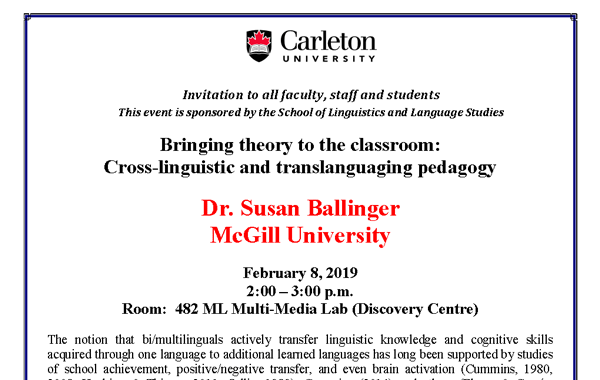Invitation to all faculty, staff and students. This event is sponsored by the School of Linguistics and Language Studies
Dr. Susan Ballinger, McGill University
February 8, 2019 – 2:00 – 3:00 p.m.
Room: 482 ML Multi-Media Lab (Discovery Centre)
Invitation to all faculty, staff and students. This event is sponsored by the School of Linguistics and Language Studies
Download the poster (pdf)
The notion that bi/multilinguals actively transfer linguistic knowledge and cognitive skills acquired through one language to additional learned languages has long been supported by studies of school achievement, positive/negative transfer, and even brain activation (Cummins, 1980, 2008; Hoshino & Thierry, 2011; Odlin, 1989). Cummins (2014) and others (Flores & García, 2017; Swain & Lapkin, 2013) have therefore argued that our current model of L2 education, which maintains firm barriers between learners’ languages, is not only illogical, but also makes it more difficult for learners to use their full range of knowledge and skills. With the rising importance of translanguaging and plurilingual orientations, pedagogical initiatives which emphasize learners’ use of their full linguistic repertoire (García & Lin, 2014; Piccardo, 2017) are on the rise; nevertheless, much is still unknown about how skills transfer and how educators can best support that transfer for more effective L2 learning. In this talk, I will outline theories and research underlying these pedagogical approaches. I will also address current challenges such as the ambiguity surrounding the term ‘translanguaging,’ teachers’ uncertainty over how to apply it in their classroom context, and the fine balance that must be struck between practices that support students’ linguistic and cultural identities and those that optimize L2 language development. Finally, I will outline current, cross-linguistic educational initiatives to illustrate the potential for these approaches.
Dr. Susan Ballinger is an Assistant Professor of Second Language Education at McGill University. Her research takes place in contexts where the language of schooling differs from students’ home language. Her previous studies have explored bi-literacy and cross-linguistic pedagogical initiatives. Her current studies focus on the development of instructional strategies to support peer learning and language use in French immersion and teacher-training tools to enhance the integration of content and language in highly diverse European mainstream classes. She is also the Canadian Associate for the European Centre for Modern Languages project, “Developing Language Awareness in Subject Classes.”

Bonjour,
I am fascinated with using translanguaging practices in my French Immersion Kindergarten classroom, with children whose first languages are Tagalog (or Filippino), Hindi and Punjabi.
Will Dr. Ballinger’s talk be available to watch online? I am currently a Master’s of Education student at the University of British Columbia; Dr. Meike Wernicke is our FRM6 Cohort supervisor.
Thank you kindly for your response.
Meredith N. McGuinnes